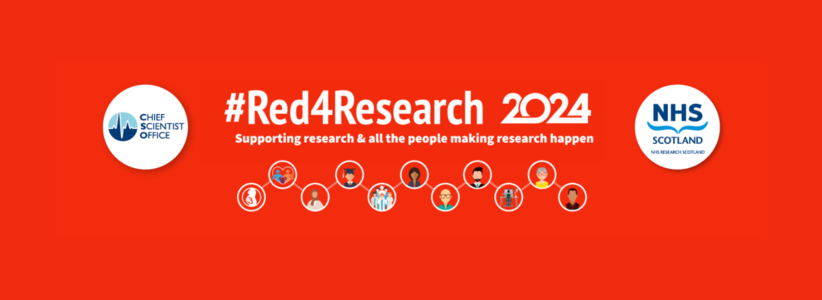Red alert! Edinburgh Castle set to be lit up for #Red4Research Day

9th September 2024
Iconic Edinburgh Castle will be lit up as part of a powerful demonstration of support in anticipation of #Red4Research Day
The capital’s internationally-recognised landmark will be illuminated in stunning red on the evening of Thursday 19 September – just prior to the day itself – to champion all of those involved in making vital health and social care research happen.
Members of the public, study participants, and researchers are being encouraged to unite on Friday 20 September for #Red4Research Day 2024 and wear red, demonstrating their support and appreciation for the commitment of those who continue to participate in, deliver, and support important studies that can make important breakthroughs.
During this vital period of renewal and transformation, research teams continue to collectively work hard behind the scenes to identify the best means to prevent, diagnose and treat conditions – an essential part of an effective, modern NHS Scotland.
Teams across NHS Research Scotland (NRS) will be getting involved in #Red4Research – now in its fifth year – with information stands being hosted by the Royal Infirmary of Edinburgh and Western General Hospital on Thursday 19 which will see staff from different specialities on hand to promote awareness of activities.
NRS Diabetes will host their own information stand on the main concourse at Ninewells Hospital in Dundee on Friday 20.
Professor Dame Anna Dominiczak, Chief Scientist (Health) for Scotland said: “On #Red4Research Day, we have the chance to express just how proud we are of our forward-thinking research community here in Scotland – and illuminating Edinburgh Castle will do that in spectacular fashion.
“It is vital that we continue to drive the research and innovation agenda by harnessing our country’s vast knowledge and experience in order to deliver the most progressive healthcare possible.
“However, as #Red4Research notes, successful research cannot be achieved in isolation, and we must remain united in our commitment to advancing healthcare. Our triple helix approach enables the fusion of medical expertise, knowledge, and insight from across NHS, academia, and industry; while the vital contribution of members of the public working closely with researchers and healthcare professionals underpins everything we do.
“Every member of this diverse group has a key role to play, from patients, carers, and family to potential future patients, and those who use health and social care services. Whether through helping to shape the direction of a research project or directly taking part in a clinical trial – that contribution is ultimately helping us to save lives.”
Last year, over 35,000 participants across Scotland took part in over 1,500 vital clinical research trials. These trials spanned all disease areas and demonstrate the incredible work of the research community in advancing future healthcare.
The benefit for patients is evident. Earlier this summer, a life-changing procedure that can prevent uncontrolled tremors in Parkinson’s patients was performed for the first time in Dundee as part of an international clinical trial.
New drug treatments are being trialled to tackle some of Scotland’s most challenging diseases such as a new drug combination as first line treatment in patients with metastatic pancreatic cancer being evaluated by the University of Glasgow, alongside NHS Greater Glasgow & Clyde. The opening of the study is considered by Chief Investigator, Professor David Chang, to be “an important milestone in the pursuit to develop new treatment options”.
Whilst technology is paving the way for further advancements in diagnosis, treatment and care with researchers in Aberdeen using an AI breast screening solution to find an additional 12 percent more cancers than in routine practice, researchers in Edinburgh have found that providing radiotherapy after surgery could prevent breast cancer from returning in the same place for up to 10 years.
These present a tiny snapshot of some of the progressive work underway by our healthcare teams to develop new and improved treatments across a range of disease areas.
New partnerships to expand research opportunities are also continually being developed with the recent announcement that NHS Scotland, researchers based at the Universities of Glasgow and Dundee, and AstraZeneca will work together on new medicines to slow the progression of chronic kidney disease, reducing the risk that patients might need dialysis or kidney transplantation.
Cabinet Secretary for Health and Social Care, Neil Gray, said the partnership represents a “shining example” of how the triple helix of academia, NHS, and industry can accelerate health studies.
NRS supports the placement, setup, and delivery of clinical research studies. As a partnership of Scottish NHS Boards and the Chief Scientist Office (CSO) of Scottish Government, it ensures NHS Scotland provides the best environment to support research and contributes towards a thriving life sciences sector.
- Register with SHARE to be informed of future research that you could be suitable for
- Search current trials by location or condition on Be Part of Research
- Join a Patient and Public Involvement Group and use your experience as a patient, carer or member of the public to help researchers design and conduct their research studies by participating in these important groups
Follow activity online at #Red4Research, #BePartofResearch and at @NHSResearchScot, @CSO_Scotland.

